Review for Fruits Basket
Introduction
They’ve remade Fruits Basket. It’s actually airing now; you can catch the latest episodes on Crunchyroll and Funimation. You can see why they did it. The original series was made before the manga was completed, and had to come up with an anime original ending. The first Fruits Basket was also from that period when anime was switching from cel and paint to a wholly digital workflow, and the animation is in 4:3 regular and NTSC SD resolution. The new Fruits Basket is in widescreen HD, and will adapt the whole manga in its entirety. It’ll be a fair bit longer than just 26 episodes. The biggest reason for the remake is that mangaka Natsuki Takaya wasn’t happy with the way director Akitaro Daiichi took the series, making it a little too goofy and slapstick compared to the source material. That’s a valid opinion; certainly you don’t see as much of the Prince Yuki fanclub in the new version, and a popular manga like Fruits Basket deserves a faithful adaptation in the same way that Full Metal Alchemist got some ten years ago.
Here’s the thing. It may have gone its own way, but I don’t think the original Fruits Basket anime was bad. Indeed it is still one of my favourite shows, and that’s not just for nostalgic reasons. Although the moment I placed the DVD check disc for volume 2 in my player back in 2004 was the moment I became an anime fan for good. It’s a show that has stood the test of time surprisingly well. You might be wondering why I double-dipped this one for a Blu-ray release, as after all an NTSC SD digipaint show from around the start of that particular medium is only going to get an upscale to Blu-ray, and Funimation’s Blu-ray release (which is the source of MVM’s release) didn’t get shining reviews when it came out 2 years ago. It’s the DVDs you see. Funimation had more than one crack at the DVDs, and the first release was plagued with combing artefacts, aliasing, compression, as well as those notoriously poor quality multi-angle credits. The second release was the one to get. Alas, the UK DVD release, the only one we ever got was based on that first Funimation DVD release, made all the worse by an NTSC-PAL standards conversion. Frankly, even a poor Blu-ray will be a significant improvement on that, although it turns out that MVM’s release has another issue altogether that might make you hesitate.
You would think that Tohru Honda has a hard life. She was recently orphaned when her mother was killed in a car accident, and had to move in with her grandfather. It got crowded enough when his family moved back in, but when the house had to be renovated, and there wasn’t enough room at his family’s place, Tohru offered to find somewhere else to live. That turns out to be a tent in the forest. But Tohru is resolutely upbeat, and rather than burden her best friends Arisa and Hana, she’s determined to keep her promise to her mother and finish high school, even if it means working her way through school, while living in a tent.
The trouble is that she’s pitched her tent on Sohma land. Yuki Sohma is in her class at school, the elegant, handsome young man who all the girls swoon over, but who keeps a resolute distance from everyone, never letting himself get too close. It turns out that he comes from an extensive and influential family, and they are surprised to learn that they have a squatter on their land. She’s a squatter they wind up rescuing when her tent is caught in a landslide. It also seems to be serendipitous, as Yuki’s house isn’t the most hospitable of residences, and he and his relative Shigure are badly in need of a housekeeper. The offer of a roof over her head seems heaven sent for Tohru, until Kyo Sohma returns from a retreat in the mountains, looking to pick a fight with his eternal rival Yuki, and oblivious to his surroundings. In the ensuing mayhem, disaster strikes, and the Sohma family’s darkest secret is revealed.
For the Sohma family is cursed. For generations, they have been afflicted with a condition that causes them to transform into the animals of the Chinese Zodiac when hugged by a member of the opposite sex. Yuki is the rat, Shigure is the dog, and following the legend of the animal that was tricked out of the Zodiac (and the cause of Kyo’s antagonism with Yuki) Kyo is the cat. Now Tohru will have to keep their secret if she is to remain among them. But there is far more to the curse than just the cute animals, and as Tohru lives among them, and meets the other members of the Sohma clan, she begins to learn the dark truths and tensions that keep them isolated and separate. But if she has the strength of will, she may just be able to help heal these damaged souls, and in the process find a place that she can call home.
26 episodes of Fruits Basket are presented across 3 Blu-rays from MVM in a 9, 9, 8 distribution.
Picture
The Blu-ray presents the show in 4:3 pillarboxed 1080p format. It’s an early digipaint show made for NTSC SD TV, so the show doesn’t look great, and certainly not as good as the currently airing remake, and the Blu-ray is only as good as the upscale the show gets. It’s a fair to middling one, clear and sharp for the most part, and with decent detail. Fruits Basket does look as if it has had the QTec treatment when it comes to the upscale. It has the telltales of sharpening applied to the line art, in the odd way that leaves a couple of lines smeared in an image. However, I have seen plenty of worse looking QTec shows when it comes to smearing. A bigger problem is that of a strange kind of strobing effect in terms of digital banding when it comes to scene transitions, fade ins and fade outs. It’s most notable during the opening credits. There is also a little shimmer on fine detail. Having said all of that, it’s still an amazing improvement over the soft, NTSC-PAL standards converted DVDs.
Sound
You have the choice of Dolby TrueHD 5.1 Surround English and Japanese with translated subtitles and a signs only track which are locked during playback. If you rely on the Hard of Hearing subtitles for the English audio, your only option is to hold onto the old DVDs, as there are no HOH subs on the Blu-ray.
I was very happy with the original Japanese audio, I like the character voices in this version, and Ritsuko Okazaki’s theme songs just can’t be matched by the translated English dub versions. However I did take in an episode of the English dub version, and after several years of anime dub homogeneity, I found it to be very refreshing. While the script translation is awkward at times, Fruit Basket’s dub is unusual in that its cast maintains a US tone to its delivery. Instead of the female voice actresses pitching their voices up to match the Japanese performances, they maintain a more natural register for them. I have to say that it’s a delight not to hear teenage girls in anime voiced with the aid of copious helium inhalation. The upgrade to surround for both languages didn’t really do much for me, as this isn’t the sort of show to benefit from a more dynamic soundstage.
Extras
You get 3 discs in a BD Amaray, with two held on a central hinged panel. This slots inside a wide cardboard slipcase, which also has the width to accommodate 12 artcards. Alas the cards are smaller than the case, and don’t feel substantial enough for the LE presentation. They should have been Amaray sized.
In the US, this was a 4 disc release, with the fourth a DVD that collected all the extra features from the previous DVD release of the show. They’re pretty substantial, including a behind the scenes featurette, a director’s interview, 3 Fruits Basket Room featurettes, and the eyecatch galleries. These are missing from the UK Blu-ray release.
The discs present their content with animated menus.
The only extra is the one created newly for the Blu-ray release. It’s on disc 3, and it’s the video commentary for episode 24. In it you can see Laura Bailey (Tohru), Eric Vale (Yuki), John Burgmeier (Shigure), and Jerry Jewell (Kyo), looking back at the show over ten years after they dubbed it.
Each episode is followed by translated English credit screens, although for some reason, they choose not to list the Japanese voice actors.
Conclusion
In every medium, in every genre, there are some select titles, timeless classics, which should never be allowed to fall out of print, never have their licenses lapse. In anime, Fruits Basket is one such title; it’s up there with Neon Genesis Evangelion, Cowboy Bebop, and Ghost in the Shell: Stand Alone Complex, in terms of its importance to the medium. Unlike those other shows, it’s a gentler, more poignant side to anime, catering for an audience more attuned to emotional nuance and character growth, than it is a masterwork of sci-fi narrative. There’s a reason why Fruits Basket was so popular a manga series, and those reasons apply just as strongly to its animated adaptation, and MVM have to be commended in ensuring that it remains available to UK audiences a while longer. That it’s available on Blu-ray with a significantly improved AV experience is just a bonus.
The Fruits Basket anime hasn’t dated as much as I would have expected. Certainly, I expected the early exploration of pure CG animation to have shown its age, but other than a distinctly SD experience, the actual technicalities of the animation hold up surprisingly well. Another thing is that Fruits Basket eschewed all the tropes and clichés of the early two thousands that would have instantly dated it, the way that shows like Love Hina and Trigun are so very much of their era. The message that Fruits Basket has to impart, the story that it shares, appeals to audiences regardless of who they are, or when they grow up.
That’s what Fruits Basket is all about, the audience that it is targeted at. It’s all about that delicate age that all children and young adults go through, where they stop seeing the world as centred on them, and start relating to other people, start seeing the world through their eyes, and start developing a sense of empathy. It happens at different times for different people, and once we begin to get set in our ways, circumstances may arise that requires us to take a refresher course. Fruits Basket does this in the most extreme of ways, introducing the Sohma family as the most dysfunctional and damaged of clans, and putting an unlikely catalyst in their midst in the form of Tohru Honda. Tohru herself has had more than her fair share of tragedy, but her positive attitude, and her willingness to give wholeheartedly of herself begins to heal the damaged members of the Sohma family, and they in turn learn from her and pass their lessons along. Of course it’s done with a whole lot of comedy and a smidge of drama as well. Fruits Basket is one of those rare shows that provokes laughter one minute, and in the next can elicit heartfelt tears, and makes it all seem natural.
The comedy comes from the absurdity of the Sohma family and their curse. The Zodiac curse means that thirteen of their number are afflicted with the result that when hugged by a member of the opposite sex, they turn into an animal of the zodiac. Tohru at first meets the dog, the rat, as well as the cat that was turned away from the legendary banquet, thus being left out of the zodiac. The legend states that the cat was tricked by the rat, which explains why cat Kyo, hates rat Yuki so much, and Tohru comes face to face with her first dysfunction, the first rift to heal. It isn’t an easy process, and isn’t necessarily complete by the end of the series, but in their mutual affection for Tohru, Yuki and Kyo find that they have something in common, which gives them something to build on. As we meet the other members of the Sohma family, we find that they take on something of the personalities of the animal spirits that possess them, and the way that they interact also adds to much of the humour.
The drama comes from the details of the curse, the fact that fear of human contact, for what may inadvertently happen, has effectively isolated the clan. They’ve become insular and closed off, and as a rare outsider allowed into the clan, Tohru begins to change that. But there is a backlash when it becomes apparent that those afflicted by the curse owe their continued lives to the head of the clan, one Akito Sohma. He’s not one to turn into a cuddly animal, but he does bear the burden of the curse through accident of birth. He’s effectively been given an early death sentence because of it, and that is why he is head of the clan, why his word is law. But the bitterness of that unjust fate taints all his interactions with his family, and that is why the members of the Sohma family can be so fearful and alone at times.
The drama is a rarity in the show, as its focus is more on the gentle comedy and character interactions. It’s only towards the end of the series that the focus shifts to something more serious as the true depth of the curse is revealed. The end also may not appeal to fans of the manga, as this is where Fruits Basket the anime diverges, but I find it an effective and moving conclusion to the show. The characters are a wonderful and diverse mix, and in the Sohma family you’ll find the playful mischief of Shigure, the destructive devotion of Kagura, the childlike optimism of Momiji, the bipolar disorder of Hatsuharu, the annoying exuberance of Ayame, the level-headed caring of Hatori, and the annoying literal wit of Hiro. But Fruits Basket isn’t just confined to the Sohma clan, and you’ll also meet Tohru’s school friends Arisa and Hana. Arisa is a reformed delinquent, while Hana has a gothic style and preternatural telepathy. Both are determinedly protective of their best friend, mostly from the Prince Yuki fan club, the high school association devoted to Yuki Sohma (mainly to stop any other member hooking up with him), who are infuriated when Tohru actually moves in with the Sohma family.
The joy of Fruits Basket comes in watching Tohru Honda discover more and more about this accursed family, meeting more of the members, and slowly, through sheer force of her personality, start to make their lives better. It’s especially heart-warming when you see characters who learn from her, apply those lessons to their own interactions, and you can see the ripples of her influence begin to spread. It’s only around the final volume that Fruits Basket begins to lose steam, something that I didn’t notice when I initially reviewed it. It’s around the last two episodes prior to the final dramatic story arc that the formula becomes apparent, and Tohru meets and helps two new members of the Sohma clan in quick succession. There isn’t the room for character growth, story development and comedy at this point, and we really don’t get to know Ritsu and Hiro with any great depth. Of course with 12 members of the zodiac to encounter, you can see why there is the desire to get a few more in, although we still don’t meet the horse and the rooster in the anime version. A couple of formulaic episodes out of a run of 26 aren’t disastrous though.
There’s room for two Baskets of Fruits in this world, as I’ve been watching the new series even as I’ve been revisiting this original. I’ve finally got to the point in that series where the story heads in a different, manga adapted direction, and I’ve become just as hooked. Like every remake it has its plus points and its minus points (the music doesn’t feel as strong in the new version), but I am looking forward to Manga Entertainment releasing its first part later this year. As for this Blu-ray release of the original series from MVM, I’m surprised to say it’s a must buy. I wasn’t expecting too much of an improvement, but compared to the original, rather poor DVDs, this Blu-ray release is much better. The one flaw is the lack of extras. If you’re double-dipping from the DVDs, and have the room to spare, then the UK release is fine, as you can keep the SD version for the extras. But if you’re coming to the original Fruits Basket for the first time, and can play Region 1 DVDs, then get the US Funimation release. The Blu-ray discs are the same, coded Region AB, and you get the extras on the bonus DVD.
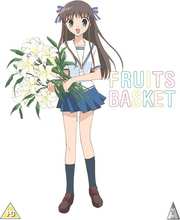
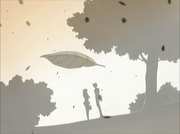
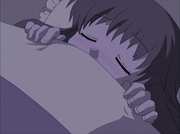
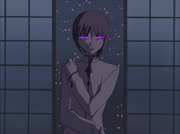
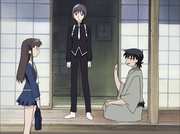
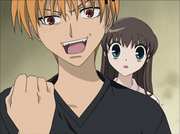
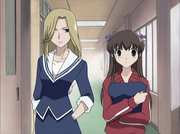
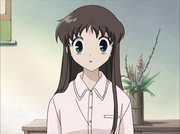
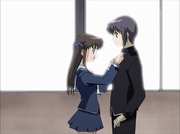
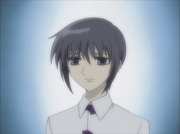

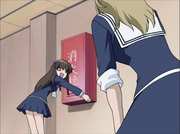
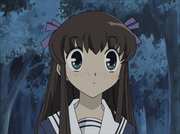
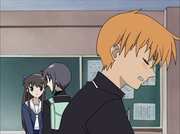

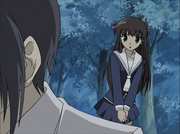
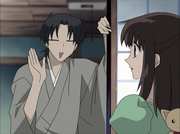
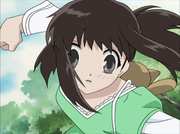
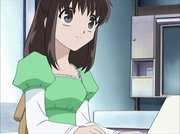
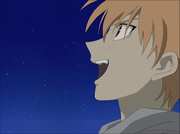
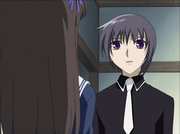
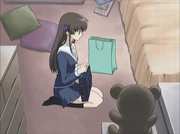
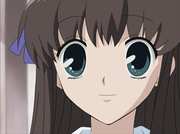

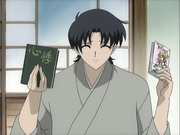
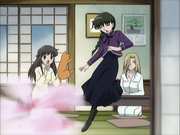
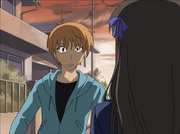

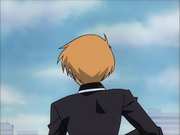
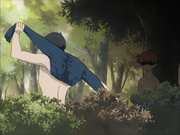
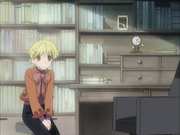
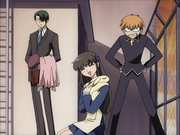














































Your Opinions and Comments
Be the first to post a comment!